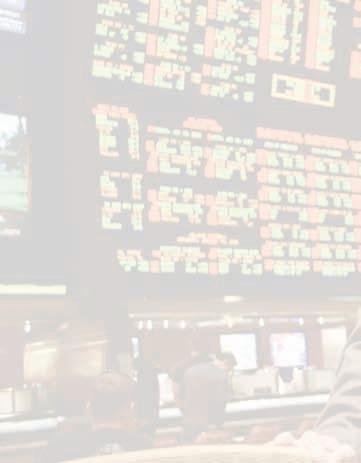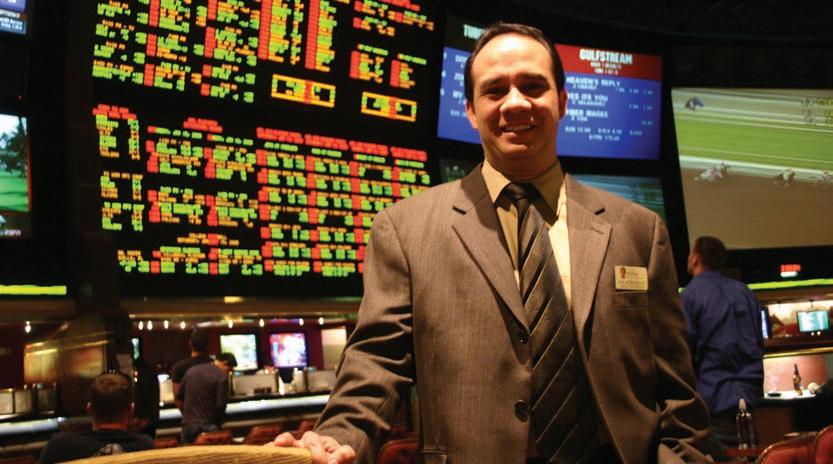
5 minute read
The Power of In-Person

By Bill Sokolic
Advertisement
This past October, two surprises resulted in record attendance at the sportsbook in Live! Casino & Hotel Philadelphia. The Phillies made it to the World Series, despite scribes and fans alike convinced the team would falter at the end of the season and continue its long march in a playoff desert, unrequited.

The second surprise: The NFL Eagles carried the only undefeated record on what scribes and fans alike expect to be a Super Bowl run, with Jalen Hurts as the starting quarterback.
“Our sportsbook saw record-breaking numbers,” says Brian Uran, vice president of marketing at Live! Casino & Hotel Philadelphia “We expected to carry that momentum forward as the Eagles advanced in the NFL playoffs and with March Madness just around the corner.”


Not to be forgotten, the NBA Sixers appear to be playoff-bound, but how deep they go, well you can hope for a Phillies-like late season resurgence rather than a one and done.
It should be noted that Live! Casino & Hotel Philadelphia occupies a unique location—within the heart of the stadium/arena complex known as the Stadium District in South Philadelphia. Lincoln Financial Field, home of the Eagles, Citizens Bank Ballpark, where the Phillies play, and the Wells Fargo Center, home for the Sixers and the NHL Flyers, are just outside the door, a leisurely stroll away. Fans attending games have a convenient locale to gather prior to the game, and place wagers.
Fans unable to attend games—when the team is on the road, for example—can gather in the same convenient locale and place in-play bets inside a sportsbook that prides itself as being more than a place to consummate wagers.
Still… Without the aura of arenas and stadiums in their midst, would bettors chuck the sportsbook and casino, cozy up on the sofa, whip out their phones and place a bet rather than fight traffic to sit in a bar watching and wagering on games? Judging from the fact that as many as 90 percent of bets come via the phone, not kiosks, not tellers, the answer is obvious. Or is it?
Up Close and Personal
Arena aura or not, the physical experience of being on-site at a retail sportsbook cannot be reproduced online.

“We know our guests crave an experiential, in-person interaction when they’re betting, and we’re well-poised to give that to them,” Uran says. “At Live! Philadelphia, the FanDuel Sportsbook & Lounge is connected to our sports bar, Sports & Social. It’s a recipe for success and one that we replicate at our other Cordish casino properties.”
Think suburban Baltimore and Pittsburgh, where two Live! casinos are located.
“Sports & Social is an incredible venue to gather, watch sports and socialize with friends over great food, drink and social games, such as Skee-Ball. The sheer convenience of the retail sportsbook can’t be beat, and it truly rounds out the overall sports-watching/sports betting experience.”
The SuperBook in the Westgate Las Vegas Resort Casino and its handful of sister properties around the country present a similar approach, except SuperBook equates with FanDuel.
“The venues are fantastic and offer an experience you wouldn’t be able to get at home,” says Jay Kornegay, vice president of race & sportsbook operations, the

SuperBook at the Westgate Las Vegas Resort Casino.
Kornegay oversees one of the more popular—and shall we say it, historic—sportsbooks at the Westgate, one dating back more than 30 years, long before the 2018 Supreme Court decision that opened the floodgates for sports betting throughout the U.S.
Here’s the darndest thing. Bettors… let Kornegay explain it:
“Even at a sportsbook with self-service kiosks and teller windows, a lot of patrons still place their bets on a mobile phone, the new-fashioned way.”
Why?
“Patrons prefer to experience the ‘sportsbook atmosphere’ at the same time,” he says.

Here’s another thing, Kornegay says:
Home team popularity aside, “most patrons that wager usually have an interest in multiple games that are simultaneously taking place,” he says. “Most can’t experience all those games at home like you can in a well-run/designed sportsbook. The atmosphere and camaraderie are unique.”
The SuperBook offers what Kornegay calls the “360-degree experience. We want the patrons to feel comfortable and have all the amenities that a typical sports fan would want. This includes showing all the games, first-class service, and incredible food and beverage.”
It’s more about what customers want from an event as opposed to making wagers for convenience. “Other than being at the sporting venue, nothing can take away from the experience at a book during a game,” says Brendan D. Bussmann, managing partner, B Global. “Sports betting is an amenity to gaming and has a purpose and role as part of the gaming floor. It brings a different energy than you get off of tables or slots.”
Casino Combination
Sometimes that means bringing a little of the casino into the sportsbook. Sportsbooks come in different sizes, and those sizes influence what you can stock it with, Bussmann says. Some include table games and slots, so customers can wager on a game of blackjack and wager on the Eagles in the same room and time frame. Many casinos, like Ocean Casino Resort in Atlantic City, are adding more gaming to the sports environment. Ocean replaced its William Hill sportsbook with the “Gallery,” a sportsbook and lounge with a few betting windows and table game enhancements.

“It is about adding other elements into the experience, whether unique food and beverage, the ultimate sports bar, or adding gaming elements in addition to what’s happening on the screens,” Bussmann says.
But is it all profitable? You hear the stories about DraftKings spending so much to promote themselves to acquire customers that they end up losing money, and have yet to declare a profit.
Yes, Kornegay says. The SuperBook turns a profit.
“Operating a sportsbook in the American market, we know what our patrons need and want,” he says. “When we build a retail outlet, we focus on those desired amenities to be successful and most of all make our guests comfortable.”
SuperBook is the equivalent of DraftKings or FanDuel, with locations in seven states, from the Meadowlands in New Jersey to The Lodge in Blackhawk, Colorado to Taft’s Ale House in Cincinnati, Ohio.
“So far, we have teamed up with two partners and run retail outlets on their properties,” Kornegay says. “We have over 100 years of American bookmaking experience in our ranks. This experience oversees these other jurisdictions.”
These various third-party vendors assist in various aspects of the business, promotions and other interactions.
“The business is growing so fast it’s vital we have these relationships to provide the service levels that the SuperBook is known for.”
Bussmann says, “This is about driving revenue across all aspects of gaming, and strong operators are continually using their database to better understand player habits to offer them the complete experience.”
Powerful Partnerships
Regardless of whether the casino runs both gaming and sports betting or an outside operator like FanDuel runs the sportsbook, this is about creating a partnership that increases gaming revenue from sports bettors and offers an amenity to gamers while they are on property. “Creating a dynamic will allow you to drive revenue on both sides of the equation,” Bussmann says.
Some of the most innovative sportsbooks today are not in casinos but in stadiums and other sports venues around the country. Capital One Arena in Washington. Nationals Park, also in D.C. In the future, the venerable Wrigley Field will sport a book. BetMGM Sportsbook at State Farm Stadium is the first in the NFL, and host to the Arizona Cardinals. It’s open year-round whether the Cardinals have a game or not. Oh yeah, it’s also the site of the Super Bowl in February.
Don’t be surprised if the Linc, the Bank or Wells Fargo sport a sportsbook in the future. Maybe all three.
“Operators that have worked with teams on these efforts can take this experience to bring the game into the casino venue,” Bussmann says. “While mobile may be the main driver, some of that revenue on mobile can and should come from within the facility if you have the right experience. Quality operators should never see any gaming element as a loss leader. The days of loss leaders hopefully died with the pandemic shutdowns.”









